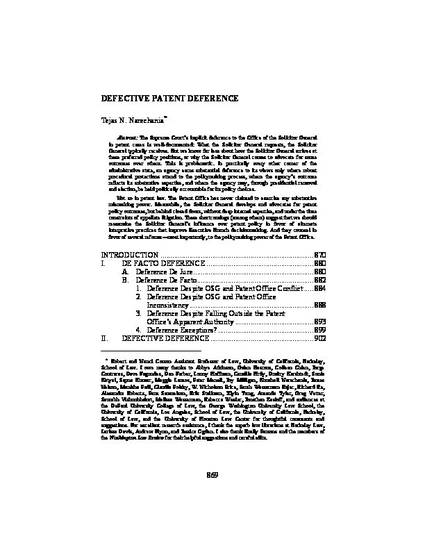
Article
Defective Patent Deference
Washington Law Review
(2020)
Abstract
The Supreme Court’s implicit deference to the Office of the Solicitor General in patent cases is well documented: What the Solicitor General requests, the Solicitor General typically receives. But we know far less about how the Solicitor General arrives at these preferred policy positions, or why the Solicitor General comes to advocate for some outcomes over others. This is problematic. In practically every other corner of the administrative state, an agency earns substantial deference to its views only where robust procedural protections attend to the policymaking process, where the agency’s outcome reflects its substantive expertise, and where the agency may, through presidential removal and election, be held politically accountable for its policy choices.
Not so in patent law. The Patent Office has never claimed to exercise any substantive rulemaking power. Meanwhile, the Solicitor General develops and advocates for patent policy outcomes, but behind closed doors, without deep internal expertise, and under the time constraints of appellate litigation. These shortcomings (among others) suggest that we should re-examine the Solicitor General’s influence over patent policy in favor of alternate interpretive practices that improve Executive Branch decisionmaking. And they counsel in favor of several reforms — most importantly, to the policymaking power of the Patent Office.
Keywords
- deference,
- patent,
- Patent Office,
- PTO,
- solicitor general,
- Chevron,
- Kisor,
- Auer,
- Skidmore,
- Supreme Court,
- Cuozzo,
- KSR,
- Myriad,
- Merck,
- patent law,
- administrative law
Disciplines
Publication Date
2020
Citation Information
Tejas N. Narechania, Defective Patent Deference, 95 Washington Law Review 869 (2020)
